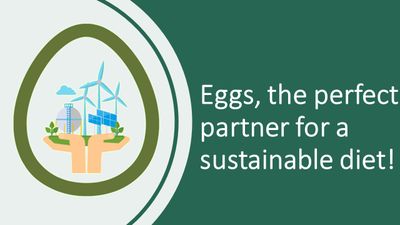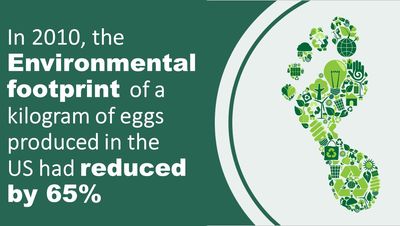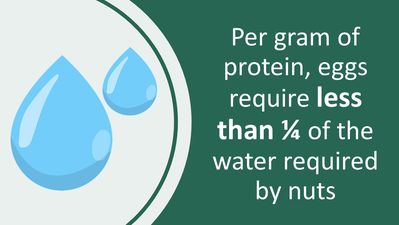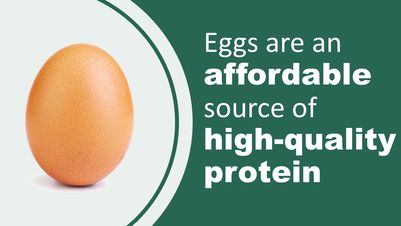Eggs, the perfect partner for a sustainable diet
Eggs contain the majority of the vitamins, minerals and antioxidants required by the body and offer a sustainable source of nutrition. We explore three great reasons why eggs can and should play an essential role in future food systems as a sustainable food of choice.
Environmentally friendly eggs
Eggs are a low impact protein source according to the World Resources Institute (WRI) Protein Scorecard[1]. This is thanks to new efficiencies and significant productivity gains that have been made on-farm and in the egg supply chain in recent years, resulting in eggs having the lowest carbon footprint of common animal protein sources and comparable to some plant-based foods.

Great examples of these improvements can be seen in Australia, Canada and the United States. Recent assessments in Australia found that hens lay 38 more eggs per year than a hen did 20 years ago, despite consuming 5% less feed. When multiplied across the entire national flock in Australia this equates to an extra 800 million eggs produced with 42,000 tonnes less grain each year resulting in an emission saving of 30,000 tonnes of carbon[2].
In 2010, the environmental footprint of a kilogram of eggs produced in the US had reduced by 65% compared to 1960, with greenhouse gas emissions reducing by 71%[3]. Meanwhile in Canada the environmental footprint of the egg production supply chain declined by almost 50% between 1962 and 2012, while egg production increased by 50%[4].

Furthermore, eggs require little water; an egg’s footprint is 29 litres per gram of protein, in comparison nuts, an example of a plant-based protein source, have a footprint of 139 litres per gram[5].
A study observing the environmental impact of three groups of Italian adults; omnivores, ovo-lacto-vegetarians, and vegans, found no differences in environmental impact between vegan and ovo-lacto-vegetarians[6]. When combined with the significant nutritional quality’s eggs hold, consumption of eggs should be considered both good for human health and planetary health.

Economic and societal benefits
When discussing sustainable diets, we must not lose sight of the economic and societal impacts of food items.
The Food and Agricultural Organisation (FAO) of the United Nations has a broad definition of sustainable diets, which includes nutrition, the environment, economics and society[7]. Eggs are an affordable source of high-quality protein, meaning they tick all the boxes as an accessible and nutritious food for the majority.

Seasonality of produce can have a significant impact on the affordability of produce, often leading to those on the lowest incomes having to make substantial substitutions to meet their nutritional intake requirement. Fresh fruits and vegetables are some of the most affected crops with a study published in 2017 finding that the average seasonal gap in food prices in seven selected countries in Africa between 2000 and 2012 was 28.3%, with tomatoes having the highest gap at 60.8%[8]. Meanwhile eggs, which can be produced throughout the year, had the lowest level of price fluctuation of 14.1%[8], offering a consistent high-quality source of essential nutrients.
Eggs are also an exceptional tool for social and sustainable development, as seen through the work of many charities. They have unique characteristics that makes implementing egg production a practical, cost-effective solution in developing countries. Large philanthropic organisations, such as the Gates Foundation and Children’s Investment Fund Foundation (CIFF), have both granted funds to increase consumption of eggs to improve maternal and child nutrition in low- and middle-income countries.
Industry commitments
The World Egg Organisation (WEO) have identified seven of the UN SDG’s where the egg industry is already making a significant impact: achieving zero hunger, good health and wellbeing, quality education, decent work and economic growth, responsible consumption and production, climate action and partnerships. The industry is continuing to strive towards meeting its commitments and is proud to have been the first global agricultural commodity to adopt the Consumer Good’s Forum’s resolution on eradicating forced labour.[9]
The variety of essential nutrients within the egg can be unrivaled by very few foods. Eggs provide essential vitamins and minerals, as well as offering the highest quality protein. Coupled with their low environmental impact, eggs are the perfect partner for affordable, healthy, and sustainable diets today – as we look to the future.
[1] World Resource Institute (WRI)
[2] Australian Eggs
[3] Poultry Science
[4] Egg Farmers of Canada
[5] Water Footprint
[6] Nature
[7] FAO
[8] Food Policy
[9] International Egg Commission